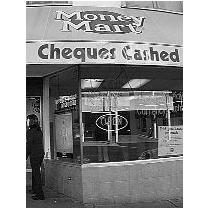Sun

Without effective consumer legislation, Money Mart is among those that can go after the victims rather than the villains for stopped cheques. Glenn Baglo, Vancouver Sun files
Google “crossed cheques” and “Canada” and you won’t find much.
Crossing is a procedure that is routine in much of the world, but little known here even though it is allowed by the federal legislation that sets the rules for cashing cheques.
Crossing cheques is a technique you should learn, since that same law, the Bills of Exchange Act, set the stage for a nasty surprise that Vancouver Sun columnist Don Cayo and others have encountered recently after stopping payment on cheques to individuals who subsequently cashed them anyway at Money Mart.
The surprise was that despite stopping the cheques through their own financial institutions, Cayo and the others were still liable for payment. When Money Mart discovered that the cheques were no good, it went after the issuers of the cheques, rather than the person who cashed them.
Money Mart was able to go after the victims rather than the villains of the pieces because the Bills of Exchange Act says that if a third party accepts a cheque it does not know has been stopped, it has the right to treat it as if it were still valid and collect from the issuer. It’s unlikely this ridiculous state of affairs will be remedied anytime soon. Canada‘s cheque-cashing rules are set in part according to international convention.
In the meantime, however, you can protect yourself by “crossing” any cheque you issue so that it can only be cashed by a bank, credit union or trust company.
If Money Mart or any other third party accepts such a cheque and subsequently finds out it has been stopped, it has to eat the loss or, as the outlets should, pursue the person who gave it to them, not the original issuer.
You “cross” a cheque by drawing two straight lines between diagonal corners. You can also write “not negotiable” between the lines.
Banks and credit unions could help their customers by issuing cheques that are preprinted with such crosses on them. Such cheques are available in Europe and Asia where they are more commonly used.
It’s sad that we now have to take such action here, but in the absence of effective consumer legislation, individuals have to protect themselves from aggressive cheque-cashing services.

